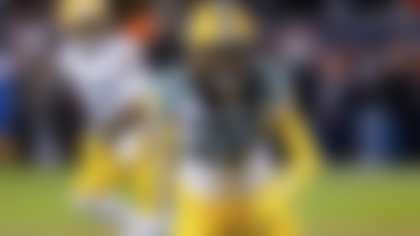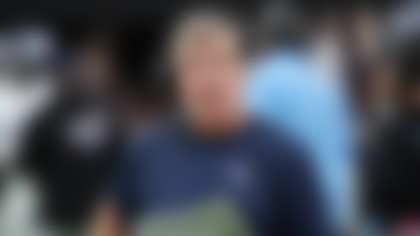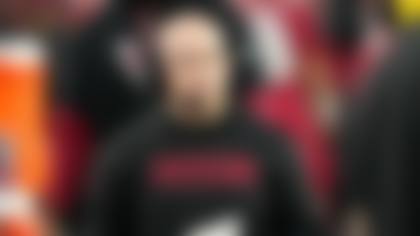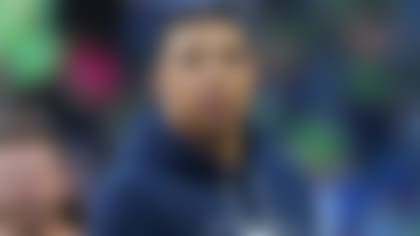In wake of the ongoing protests around the country following the death of George Floyd, NFL Total Access committed its time on Monday to focus on the issues at hand.
Joining NFL Network's Steve Wyche, a round table including Buffalo Bills cornerback Josh Norman, quarterback Josh McCown, and NFL Network's Michael Robinson held a transparent discussion on the country-wide protests and the resolute actions needed going forward. Norman and McCown are each members on the Players Coalition task force.
"For me, personally, this is a time we should all be praying," Norman said in response to the notion of athletes sticking to sports. "This is a time we definitely need to take out and reflect. It's definitely one of those times where racism has been at its highest point since Jim Crow. I think that if you go back all the way to that time, there's been plenty of cases where we've been band-aiding what's been going on and when you look at it decade after decade after decade, these racist events have occurred and there have been band-aids pulled over them. But now we're here in the new millennium, 2020, and that band-aid has been pulled off, and you see what it really is for those who have blinders on and don't really want to see what it is to go through life in America as a black man.
"It's really really hard and frustrating to grasp how others don't understand what the feelings is, but now they're seeing that things have transpired, that it's much much worse than they thought. And as I go back to that band-aid analogy -- we need to sew that up. We need to find a way where we come together and sew that band-aid up. No longer let it be a band-aid, no longer let it be a wound that's there, we need a doctor to come in and souse that thing up. Or else the next generation is going to carry it on. They're seeing it. You see picture and videos of children out there protesting, little people -- those are our future. So what are we sharing with them? What are we telling them? And when I look at that as an NFL player having a voice to say something because I actually have been in that space before, we all haven't been here, we all just didn't happen to be here, we had to work through something, we had to come through those trials and tribulations to get where we are today, and if there's something I would say is, don't take what you've done for granted. For others. Put yourself in their shoes. Because right now what's going on is that people are really really angry at the problem, and the problem is what we are facing today. And as you can see right now, people are acting out over that -- and rightfully so. Because if you protest quietly, you go quiet, okay, and then now, this is what they're doing -- now I'm not condoning the looting, but to be heard, what is that?
"So, I just think if you look at it overall, the scope of everything, people really need to come together and ask themselves, what can I do to help out my African-American brother? What can I do, as a white person, as an American, as a Hispanic, everybody -- we're all in this together -- what can I do to help out the next race? Because if we don't, things like this are going to continue. and it should start right now because everybody is being affected by it. COVID- 19 doesn't make it any better. But when we out all that and we combine it together into one you see this big combustible form and everybody is just pent up. The aggression is all in there and they want to get it out and express that because of what's going on and people who lost their lives for a senseless act. Just senseless. But it's been going on for years and decades, so now we're at a point where we can actually voice that and fight that back. So what does that look like, what are those solutions? And that's why we're here today -- to talk about those things."
Following up Norman's thoughts, McCown explained his analogy which was birthed from his understanding through conversations with his peers.
"For me, just having to try and understand the best I can by sitting with friends and teammates of different ages, some retired players where in that group, and everybody going around that table and telling me about 'the talk,'" McCown said. "They're talking about the talk that our parents have to have with us about what happens when somebody follows you around a store, what happens when you get pulled over, and these are discussions that I didn't really have to have as a person. And the image put in my mind is like a weighted vest, and if I can put it in football terms to help you understand it better, you know, I've been in a lot of offenses and I've changed offensive coordinators every year of my career, and when you go into an offseason and you're learning the name of the formation, the name of the play, you're not really focused on how to attack the defense, you're just focused on what you're doing. And if you're competing against another quarterback and maybe he's been in that system awhile, he's attacking the defense. So he's getting out of bed with a leg up everyday because he understands who he's attacking, he's not studying the playbook. I was studying the playbook, I was just trying to know the stinkin' play so I can get out of the huddle whereas he's steps ahead of me, and I think it's the same thing: the weighted vest.
"As a white person in America, when you wake up there's things you're not even contemplating, that you don't even have to think about, that you can advance yourself in a manner that you're attacking the defense, you're going about your day differently. Whereas an African-American in this country, the experience is vitally different and that's what I learned from my brothers around the table was that they're waking up and having conversations, just like me as a player, about the playbook. Just the basic things that you shouldn't even have to talk about, but you have to talk about it in an African-American context. From then on it burdened my heart that we're different and our experiences are different. If our experiences are different, we have to talk about that. And that's not for the African-American to talk to a white person about it -- it's white people to talk to white people about that.
"It's the conversations inside our own walls that we must change, and it's a language inside our own walls that we must change. So that really burdened my heart and from then on, obviously my friend, former teammate Anquan Boldin, Malcolm Jenkins and the guys that started the Players Coalition, we wanted to start using our voice and leveraging our platform for good to hope we make a dent in this and bring about change. Sometimes I feel like we're put in a space that, it's not about praying for change but it's praying for courage to be the change. That's what it is about right now. I'm thankful that other people, in the middle of this global pandemic, we're finally realizing what the real pandemic is, and we're finally seeing it. I'm so heartbroken for George Floyd and his family. So my prayer is that there would be courage to rise out of this and good to come from this, and that we would continue to move this thing forward and gain ground in this area because this is a true thing that's going to kill us. It's not COVID-19, it's this. This is what we have to fight against. It's on us as white people to step up, have a conversation with one another that would start to change and break the generation of cycles of racism that we see throughout our country."
Robinson, who expressed his views earlier in the morning on Good Morning Football, followed up McCown's thoughts and conveyed the positive message he's seen in wake of all the protests.
"You said some very powerful things brother," Robinson said. "You say the term African-American but we say white to the other side, and it's just like, just the way that we use the terms; why am I seen as an African-American and not just an American? Why is Colin Kaepernick, when he's taking a knee, seen as somebody disrespecting the flag and disrespecting what it stands for, yet, some of the same people that spoke out against Colin Kaepernick are silent right now?
"It's these types of uncomfortable conversations to see each other's point of view that must happen. Something positive that I've seen throughout this whole ordeal is young people out in the streets. If the next generation is very aware of the big elephant in the room, which is white supremacy to a degree, then hopefully they can be the generation to end it."












